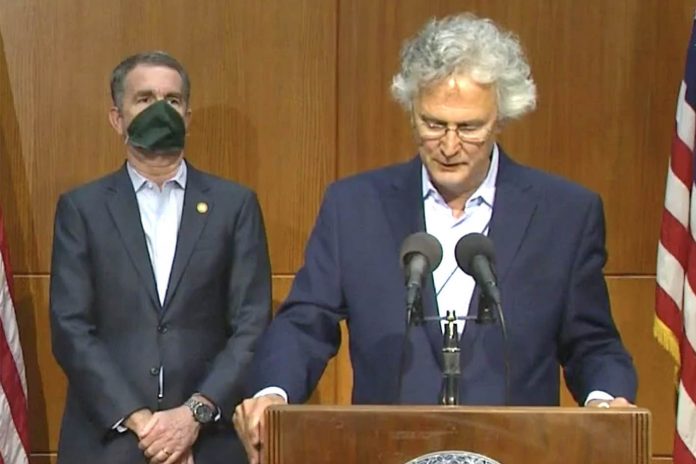
By Carol Vaughn —
Gov. Ralph Northam announced Thursday he is extending the term and expanding the mission of the Commission to Examine Racial Inequality in Virginia Law.
Northam established the commission a year ago to identify racially discriminatory language in state law that should be eliminated.
The nine-member commission found nearly 100 instances of discriminatory language in a partial review of the Acts of Assembly. Legislation to remove it passed the General Assembly unanimously this year.
The commission’s expanded mission will include looking at current state laws and regulations “that create or perpetuate inequities, with a focus on public safety, criminal justice, health, housing, and voting” and proposing changes to increase protections for minority Virginians, Northam said.
A report from the commission, with recommendations, is expected by Nov. 15.
The commission website is https://www.governor.virginia.gov/racial-inequity-commission/
Northam also spoke about the recent toppling of Confederate monuments in Richmond and Portsmouth by protestors.
“I have said that I believe Confederate monuments are divisive and glorify a racist and painful time in our history,” he said, noting the Commonwealth has committed to removing the Robert E. Lee monument in Richmond, which stands on state-owned ground, and the Richmond City Council has agreed to remove other Confederate monuments.
“We all came together to create a process to do that safely. We need to let that happen because the statues are very large and they are very heavy,” he said, noting a demonstrator in Portsmouth was seriously injured when he was struck by a statue that was being pulled down.
“I know these statues are causing a lot of pain, but pulling them down is not worth risking someone’s life, so let the local governments take the responsibility for taking these statues down safely,” Northam said.
He also urged protestors to wear face coverings and maintain physical distance as much as possible and to get tested for COVID-19.
Phase 2 Continues
Northam said so far Virginia is not seeing a spike in COVID-19 cases, after most of the state entered Phase 2 of the Forward Virginia plan to safely reopen the state’s economy on June 5.
Richmond and Northern Virginia were to enter Phase 2 June 12.
The state will stay in Phase 2 for a minimum of two weeks, he said, urging Virginians to remember “this virus is still with us.”
Phase 2 allows the maximum number of people at a public gathering to increase from 10 to 50; restaurants to offer 50% of their indoor seating to customers; and fitness centers to open indoor areas at 30% capacity, among other easing of restrictions.
Planning to Reopen Colleges and Universities
Northam Thursday announced reopening plans for Virginia higher education institutions, after announcing similar guidance for K-12 schools earlier in the week.
“They can begin to reopen their campuses and offer in-person instruction, but they must follow all relevant guidances in the phases outlined in our Forward Virginia plan and in public health guidelines,” he said.
Colleges and universities must submit a comprehensive reopening plan to the State Council of Higher Education for Virginia for review before they can proceed with reopening their campuses.
Plans must be based on the best available public health information and the Virginia Department of Health’s higher education testing guidance, Northam said.
“Each institution will take on this challenge in a way that meets their unique mission and circumstance,” he said.
Peter Blake, Director of SCHEV, spoke at the briefing about challenges to higher education from the pandemic as well as the challenge to increase diversity on Virginia campuses.
“We have been shaken by the events of the last several weeks…What has happened recently is a manifestation of the injustice and racism that has existed for too long. It is time to confront these inequities where we work and where we live,” he said.
The pandemic has further highlighted inequities in higher education, according to Blake.
Those include lack of internet access by many Virginians.
“The digital divide is real and contributes to these learning gaps,” Blake said, adding that expanding access to devices and broadband “is mission critical, especially now.”
He said SCHEV recently received a grant from the LUMINA Foundation, a non-profit that focuses on creating learning opportunities after high school that benefit everyone.
The purpose of the grant is to close achievement gaps in higher education, Blake said.
He noted Northam’s guidance to reopen higher education campuses safely is one of the first of its kind in the nation.
Institutions’ reopening plans at minimum must address: repopulation of the campus; monitoring health conditions to detect infection; containment to prevent spread of the disease when detected; and shutdown considerations if conditions warrant it, Blake said.
Blake said among features of “a new normal” on campuses will be more online or hybrid courses; smaller classes; staggered schedules; a more spread out residence life; and non-traditional ways of offering food service, among other changes.
“While college life will change, the energy, creativity, and commitment shown by college and university faculty and staff will ensure that the learning experience will not be sacrificed,” Blake said.


